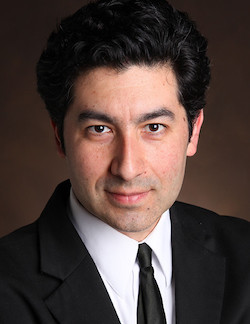
(Vanderbilt University)
A Vanderbilt astronomy professor recently was named a Howard Hughes Medical Institute Million-Dollar Professor for his work to keep more women, underrepresented minorities and persons with disabilities in the physical sciences.
Keivan G. Stassun, Stevenson Professor of Physics and Astronomy, proposes to retain these groups from their first year through Ph.D. by early and sustained immersion in research, building on Vanderbilt’s current push toward more immersive experiences for its undergraduates.
“Data show that, as freshmen who are underrepresented minorities are just as likely as their majority peers to express an interest in physical sciences majors, but they’re overwhelmingly more likely to switch by their sophomore or junior years,” he said. “Immersive engagement in research, starting very early, can be a key intervention to help these students develop a ‘science identity,’ which is so crucial to persistence in the field.”
Stassun plans to connect the HHMI grant’s focus on the earliest stages of the pipeline with his recently awarded NSF INCLUDES grant, a program aimed at identifying and sharing successful efforts to keep underrepresented minorities and persons with disabilities in the fields of science, technology, engineering and mathematics (STEM). The ultimate vision for the overall effort is what Stassun describes as a “model pipeline from high school to the workforce,” with early and sustained engagement in research as a central feature every step of the way.
As a particular focus of the HHMI grant, Stassun also will work with the new Initiative for Autism and Innovation at Vanderbilt, where he is director. The new initiative brings together researchers, educators, employers and others to more fully include people on the autism spectrum in the workforce, particularly in STEM areas. The initiative is a novel collaboration of faculty in the College of Arts and Science, the School of Engineering, the Graduate School, the Owen Graduate School of Management and Vanderbilt Kennedy Center. The aim is to:
- develop new measures of uniquely autistic capabilities for scientific discovery;
- invent new devices and technologies to support individuals with autism to succeed in the research environment;
- develop new artificial intelligence approaches inspired by autism-related modes of thinking; and
- develop the organizational science approaches needed for businesses to fully harness the capabilities of their neurodiverse employees.
“A major priority area of the Vanderbilt Kennedy Center is to develop evidence-based strategies to advance the opportunities for neurodiverse individuals to engage in meaningful work,” said Vanderbilt Kennedy Center director Jeff Neul. “This HHMI Professor award to VKC member Keivan Stassun is built upon an exciting collaboration that leverages the expertise of multiple VKC members and investigators from across the university. It will have life-changing impact on individuals with autism both at Vanderbilt and in the broader community, and will demonstrate a pipeline to workforce engagement that can serve as a national model.”
For Stassun and his collaborators, this work is also personal. “We have an opportunity to advance discovery and innovation through more meaningful inclusion of neurodiverse individuals, including Vanderbilt undergraduates who are on the autism spectrum,” said Stassun, father to a son with autism.
Patrick Young, an astrophysicist at Arizona State University who is on the autism spectrum, said, “universities and even entire professions such as astronomy have become much more comfortable talking about the benefits of diversity and inclusion, but ironically neurodiversity is too often not included in the equation.”
The HHMI Professors program identifies highly accomplished research scientists who have compelling ideas to advance science education and provides them with flexible support to try out those ideas. The program empowers and raises the visibility of scientists with high research credibility as exemplars of and advocates for excellence in science education.
HHMI awarded 14 new professors $1 million over five years. One-fifth of Stassun’s award is earmarked to support his astrophysics research group, which has become a leading producer of underrepresented minorities and individuals with autism achieving the Ph.D. in physics and astronomy. The remainder of Stassun’s award will be dedicated to building his pipeline model for diverse—including neurodiverse—students.
Learn more about the HHMI professors.